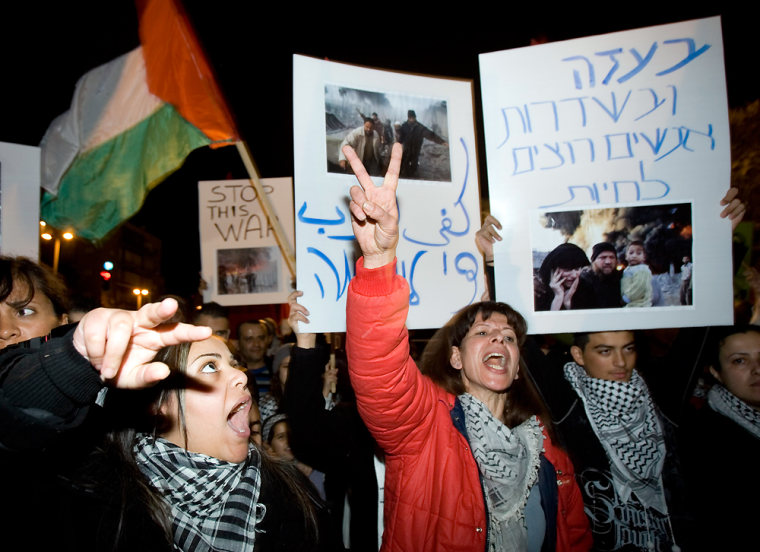A rocket exploded a few hundred yards from Mateb Abu Nasr's house, driving home the message that tens of thousands of Israeli Arabs living within range of militant attacks from Gaza are just as vulnerable as their Jewish neighbors.
But there's a difference: When the wailing sirens warned of an incoming missile, Abu Nasr's family had nowhere to hide.
Homes in Jewish towns and settlements are required to have one room with reinforced walls and a steel door. Public bomb shelters are accessible, and protective barriers even have been erected in rural areas.
The Arab town of Rahat, population 45,000, is about 24 miles from Gaza and is situated on the outer perimeter reachable by the long-range rockets that Hamas has unleashed for the first time. Few homes here have a safety room, and there are no public shelters
'Clear discrimination'
"This is clear discrimination," said Hassan el-Rafia, an Arab regional official, who says the lack of defenses is typical of the way Israel treats its Arab citizens. Arabs comprise about 20 percent of Israel's population of 7 million people.
The Israeli army said it has launched a public information campaign in Arabic-speaking towns like Rahat with the help of Bedouin army veterans and through Arabic language broadcast and print media. They are encouraging people to keep their radios to a special silent frequency that turns on only to broadcast air-raid alerts.
Militants from the Hamas movement that rules Gaza have fired dozens of rockets daily at Israeli towns and settlements since a six-month cease-fire expired last month. Israel launched a massive air campaign Dec. 27 and a ground invasion Saturday night meant to silence the rockets.
More than 480 Palestinians have been killed in Gaza, according to Gaza health officials.
2 Arab-Israelis killed
In Israel, Hamas rockets have killed four people — two of them Arabs. One was a soldier from the Druse sect from northern Israel. The second was a construction worker in Ashkelon, the closest Israeli city to Gaza.
The missile fired Tuesday overshot Rahat by about half a mile, landing on the hilly outskirts between clusters of squat, tin-roofed buildings and a few black Bedouin tents.
"We saw it go right over that olive tree," said Abu Nasr, pointing to a tiny grove 100 feet from his home of cinder block and cement. "When it started to descend we could see a tail of white smoke."
The missile blasted a 5-foot-wide hole in the hard, barren land, harmlessly scattering shrapnel and pellets. Children gathered up metal shards as souvenirs, while adults filmed the semi-buried warhead on their cellphone cameras.
"Another 100 yards and a lot of people would have been killed," said Abu Nasr, 36, a high school teacher.
Like many of the Palestinians of Gaza, the Abu Nasr clan and thousands of other people were displaced after the 1948 war that led to Israel's statehood. Unlike the Gaza Palestinians, they stayed in Israel and became citizens. But land disputes were never settled, and many live in simple homes built illegally and under constant threat of having their homes bulldozed.
Since the 1960s, Israel has encouraged the once-nomadic Bedouin Arabs to move into towns built for them, like Rahat.
But many rejected the urban lifestyle. About 76,000 Bedouins now live in villages that have not been recognized by the government and receive no services such as city water, roads or health facilities, says Physicians for Human Rights, a group that has been operating clinics and lobbying on land issues for 20 years.
"They are stuck in the middle between demolition by Israel and the missiles from Gaza," said Wassim Abbas, a spokesman for the organization.
